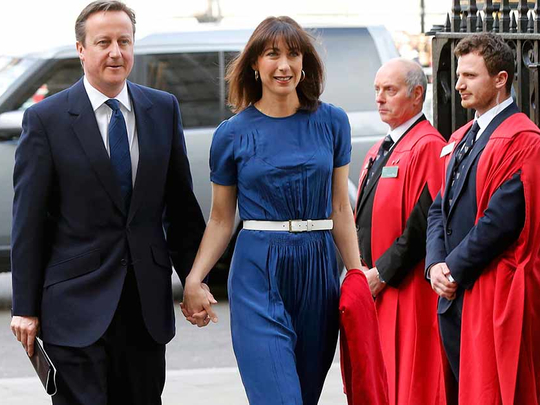
London: David Cameron, who won a surprise UK parliamentary majority last week, named more ministers to his cabinet as the Labour opposition debated why it lost and lawmaker Liz Kendall started a bid for the party leadership.
Michael Gove was moved to justice secretary, Mark Harper replaced him as chief whip in charge of Conservative Party discipline, and Chris Grayling, who had been running the Ministry of Justice, became leader of the House of Commons, responsible for the timetabling of government business in the chamber. Nicky Morgan remained education secretary. Cameron reappointed Chancellor of the Exchequer George Osborne and other senior ministers on Friday.
In the Labour Party, which lost 10 per cent of its seats in Parliament, younger lawmakers moved to make the case for a change of direction from Ed Miliband, who quit as leader on Friday. They were supported by former Business Secretary Peter Mandelson.
“The awful shocking thing about this election is that Labour could have won it, or at least come a very near second,” Mandelson told the BBC. “We were sent out and told to say things and to make an argument — if you can call it an argument — which basically said: We are for the poor, we hate the rich, ignoring completely the vast swathes of the population who exist in between.”
Liz Kendall, a junior spokeswoman on health care, was the first lawmaker to confirm she’ll run, answering simply “yes” when asked in a BBC interview if she’s running.
Thursday’s defeat for Labour was “huge,” she said. “It’s not enough to just critique what’s going wrong in this government. We’ve got to give them a positive alternative.”
Two others first elected to Parliament, like Kendall, in 2010 have so far indicated an interest in replacing Miliband. Education spokesman Tristram Hunt told the BBC he was “definitely thinking about it.” And business spokesman Chuka Umunna said he was “thinking about the future of the party,” though adding it was “too early to say” whether he’d run.
Bookmaker William Hill Plc installed Umunna as favourite to be the next leader, followed by health spokesman Andy Burnham, justice spokesman Dan Jarvis, home-affairs spokeswoman Yvette Cooper, Hunt and Kendall.
“The debate needs to be long and deep and painful for the Labour Party because we are in a real hole,” Hunt told the BBC. “There was a hesitation about Labour being proud and optimistic about the modern country we live in.”
Tony Blair, who led Labour to three election wins starting in 1997, offered his own prescription in an article for the Observer newspaper.
“Labour has to be for ambition and aspiration as well as compassion and care,” Blair said. “Hard-working families don’t just want us to celebrate their hard work; they want to know that by hard work and effort they can do well, rise up, achieve.”
Umunna set out a similar stall in the same newspaper. “Our vision as a party must start with the aspirations of voters: to get on and up in the world, to see their children and grandchildren do better than they did, to get that better job, to move from renting to owning, to take the family on holiday, to move from that flat to that house with a garden,” he said.











